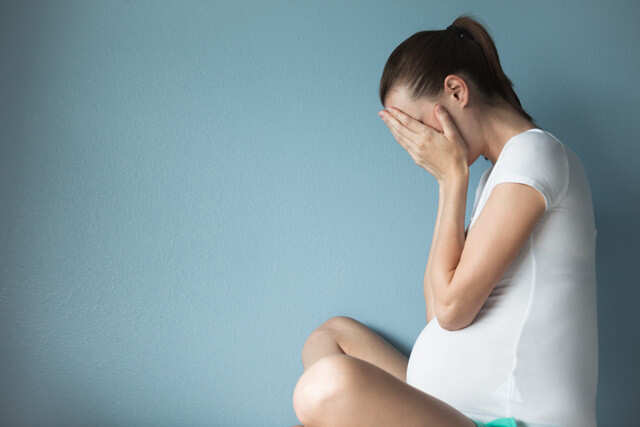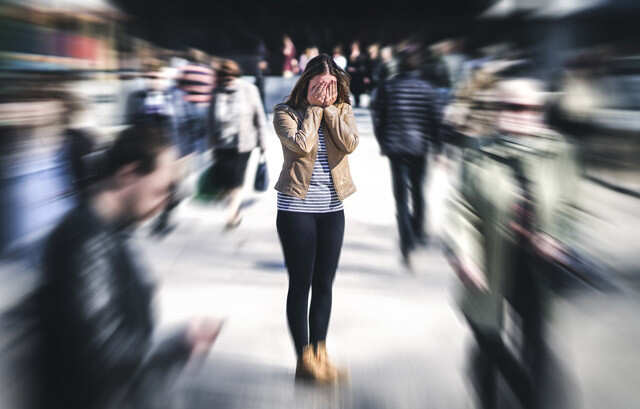Depression or anxiety, which is the leading cause of incapacity worldwide, has been found to be far more widespread in women than it is in men. It has been extensively documented that there exist gender differences in depression prevalence, with women experiencing major anxiety bouts as opposed to men.

Research states that amongst young people falling under the age group of 14 to 25 years, women are more than twice as likely to show depression signs than men.
Below mentioned are some factors that might account for an increase in the gender differences in rates of emotional turmoil experienced by women.
Puberty
 Image: Shutterstock
Image: Shutterstock
Hormone fluctuations during puberty may increase the possibility of developing depression among women. However, transitory mood swings related to changing hormones during puberty are considered to be normal and can’t alone lead to anxiety. Some other experiences that have a role to play in contributing to depression include emergence of sexuality and identity issues, parental conflicts, and academic pressure. Since girls tend to reach puberty before boys do, they are more prone to developing depression at an earlier age than boys. This depression gender gap may continue throughout the lifespan.

Hormone fluctuations during puberty may increase the possibility of developing depression among women. However, transitory mood swings related to changing hormones during puberty are considered to be normal and can’t alone lead to anxiety. Some other experiences that have a role to play in contributing to depression include emergence of sexuality and identity issues, parental conflicts, and academic pressure. Since girls tend to reach puberty before boys do, they are more prone to developing depression at an earlier age than boys. This depression gender gap may continue throughout the lifespan.
Pregnancy
 Image: Shutterstock
Image: Shutterstock
Dramatic hormonal ups and downs occur during pregnancy, and these can impact mood in a big way. Other issues responsible for surging risk of developing anxiety when you are expecting or even if you are trying to conceive include faulty lifestyle, relationship issues, previous depression episodes, absence of social support and infertility problems.
Postpartum Depression
It is normal for many new mothers to find themselves sad, angry and short-tempered, and experiencing crying spells soon after delivering the baby. Also known as the baby blues, these feelings generally lessen within a week or two of child birth. But experiencing long-lasting anxiety bouts or feeling depressed may indicate postpartum depression, particularly if signs include, crying for no reason, low self-esteem, feeling numb, trouble sleeping, inability to care for the new born or in extreme cases, thoughts of harming yourself. This problem occurs in about 10-15% women and must be promptly addressed.

Dramatic hormonal ups and downs occur during pregnancy, and these can impact mood in a big way. Other issues responsible for surging risk of developing anxiety when you are expecting or even if you are trying to conceive include faulty lifestyle, relationship issues, previous depression episodes, absence of social support and infertility problems.
Postpartum Depression
It is normal for many new mothers to find themselves sad, angry and short-tempered, and experiencing crying spells soon after delivering the baby. Also known as the baby blues, these feelings generally lessen within a week or two of child birth. But experiencing long-lasting anxiety bouts or feeling depressed may indicate postpartum depression, particularly if signs include, crying for no reason, low self-esteem, feeling numb, trouble sleeping, inability to care for the new born or in extreme cases, thoughts of harming yourself. This problem occurs in about 10-15% women and must be promptly addressed.
Peri-Menopausal Phase
 Image: Shutterstock
Image: Shutterstock
Reaching menopause is generally considered to be a time when a woman’s chances of undergoing depression decline. But the peri-menopausal phase is a time of increased risk, particularly for women having a history of depression. When levels of oestrogen tend to fluctuate, dopamine, serotonin and norepinephrine levels in the brain tend to be impacted. These are the chemicals that have a direct role to play in uplifting your mood. Hormonal imbalances like rise in oestrogen or fall in progesterone can hinder the ability of serotonin and norepinephrine to act as effective neurotransmitters. This results in a rise in depression among women close to menopause.
Social Roles Take A Toll
Women who become housewives and mothers may find their roles undervalued by society. Meanwhile, working women keen on pursuing a career outside the home may face gender discrimination and inequality on the job or may experience conflicts between their role as a wife, mother and their work. Alongside, dealing with body image issues also adds to the emotional baggage. While the stress to look a certain way or match a certain body type, all have an impact on the female psyche, it is necessary to comprehend how serious will the bearing be on our mental and emotional well-being.
The socialisation of gender roles and traits has been connected with how effectively people cope with anxiety and the effects that stress has on one’s well-being. Women tend to follow more emotion-focused and ruminative coping techniques as opposed to men. Women need to be guided to transmute their pensive anxiety dealing methods into a more problem-focused approach to help them lessen depression and vulnerability.

Reaching menopause is generally considered to be a time when a woman’s chances of undergoing depression decline. But the peri-menopausal phase is a time of increased risk, particularly for women having a history of depression. When levels of oestrogen tend to fluctuate, dopamine, serotonin and norepinephrine levels in the brain tend to be impacted. These are the chemicals that have a direct role to play in uplifting your mood. Hormonal imbalances like rise in oestrogen or fall in progesterone can hinder the ability of serotonin and norepinephrine to act as effective neurotransmitters. This results in a rise in depression among women close to menopause.
Social Roles Take A Toll
Women who become housewives and mothers may find their roles undervalued by society. Meanwhile, working women keen on pursuing a career outside the home may face gender discrimination and inequality on the job or may experience conflicts between their role as a wife, mother and their work. Alongside, dealing with body image issues also adds to the emotional baggage. While the stress to look a certain way or match a certain body type, all have an impact on the female psyche, it is necessary to comprehend how serious will the bearing be on our mental and emotional well-being.
The socialisation of gender roles and traits has been connected with how effectively people cope with anxiety and the effects that stress has on one’s well-being. Women tend to follow more emotion-focused and ruminative coping techniques as opposed to men. Women need to be guided to transmute their pensive anxiety dealing methods into a more problem-focused approach to help them lessen depression and vulnerability.

0Comments